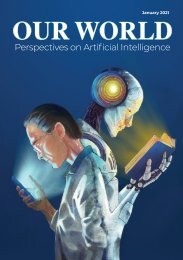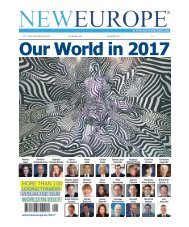Our World in 2018
Leading minds reflect on the state of our societies, and examine the challenges that lie ahead. An edition dedicated to generating ideas that will help form a new vision for our world.
Leading minds reflect on the state of our societies, and examine the challenges that lie ahead. An edition dedicated to generating ideas that will help form a new vision for our world.
You also want an ePaper? Increase the reach of your titles
YUMPU automatically turns print PDFs into web optimized ePapers that Google loves.
Safeguarding Elections
in the Digital Age
By Jimmy Carter
Technology threatens to fundamentally
change the nature of elections and
democratic governance.
New media, including social media,
are fueling political polarization as people
communicate with general audiences and
narrowly focused groups, without the
deliberation typical of traditional forms of
communication. Hacking, misinformation,
“fake news” and cybersecurity threats
are expanding the power of a few while
of mass media and information. Politicians
are using detailed voter information to play
to their bases, allowing them to ignore the
rest of their constituents.
Democratization, which had advanced
steadily for decades, is now threatened by the
rise of authoritarian governments and the
closing of the political space to civil society,
journalists and others.
Advances in election technology are also
bringing new opportunities and new fears
— founded and unfounded — about the
security of the election process. Technology
is being introduced into electoral processes
to promote efficiency, but it also moves
voting and counting into the unobservable
digital realm. In the Netherlands, electronic
voting has been abandoned amid concerns
about foreign interference in elections.
During the 2016 presidential campaign in
the United States, Russian hackers broke into
the Democratic National Committee’s email
election’s outcome.
We must accommodate these changing
times while holding true to our unchanging
principles — equality, justice and freedom for
all. This means building political processes
that are inclusive and transparent and that
hold those in power accountable.
Jimmy
Carter
Jimmy Carter,
Former United
States President
Jimmy Carter
founded the
C
Center to advance
peace and health
worldwide.
Democratization,
which had advanced
steadily for
decades, is now
threatened by the
rise of authoritarian
governments and
the closing of the
political space to civil
society, journalists
and others.
In the United States, our path has been
nonlinear and riddled with failures, including
slavery, racial and sexual discrimination,
and abuse of indigenous peoples. The gap
between rich and poor has grown wider in
recent decades, while longstanding barriers
to voter participation, equal justice and
economic opportunities for all remain.
Nevertheless, we persevere, striving to
correct and improve our democracy.
Internationally, globalization has
contributed to increasing wealth, but billions
of people still struggle under crushing
poverty. We now face the threat of that
and subsequent government decisions.
Our society has worked to develop
global norms and an international system
to protect human rights for decades, from
the development of the United Nations and
the adoption of the Universal Declaration of
Human Rights in 1948 to current worldwide
efforts to secure political, economic and
social rights. At The Carter Center, we helped
strengthen the United Nations’ system.
During the course of observing more than 100
elections, we also worked to build consensus
on international election standards that are
66 2018 | OUR WORLD










